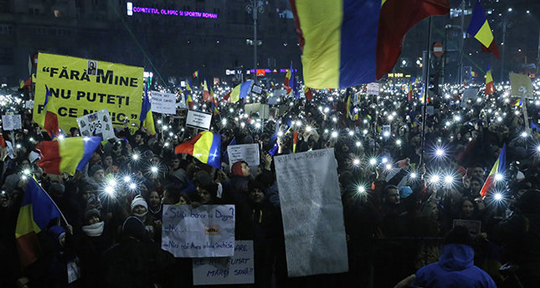Bucharest, Feb 7: Romania's government is on a high-risk mission: devise a legal and politically acceptable way to remove penalties for some types of official corruption.

First, the government tried to effect the change by imposing an emergency decree without public debate. The move backfired badly, sparking massive demonstrations in the capital of Bucharest and other major cities that caused the government to reverse course.
The standing of the left-leaning government that assumed power two months ago has fallen so quickly that leaders found it necessary Monday to assert they would not resign even as the protests continued. The prime minister says a new proposal will be put before Parliament instead.
Is there a legal and political path for the government to accomplish its goal of easing corruption rules for public officials? Experts say Parliament can indeed pass such a law, and it could take effect if the president signs it, but the political task of winning support is trickier.
Laura Stefan, a Romanian anti-corruption specialist with the Expert Forum public policy think tank in Bucharest, said the government made a strategic blunder with the emergency decree. It would have tolerated abuse of power by officials, ranging from a mayor in a small village to a top government minister, if the amount of graft involved totaled less than about $48,500.
"It's simply un-defendable," Stefan said. "How can you explain to the people of this country, who maybe don't make $50,000 in their lifetime, that it is okay for public officials to misuse their office in order to obtain less than $50,000 from the state budget."
Public officials have not offered a specific explanation for why the law is needed, although one minister said it would bring the country in line with other European nations. The decree also would have applied retroactively to officials already convicted of corruption offenses involving less than $48,500.
The threshold figure would not have applied to case in which money was stolen, which would still be prosecuted as theft, but could apply to mismanagement of public funds, kickbacks on purchases or contracts, or other types of official misconduct. It would apply to officials who have hidden interests in companies that they set up and then make purchases from while in office.
One possible beneficiary would be Social Democratic Party leader Social Democratic Party leader Liviu Dragnea, whose path to becoming prime minister has been effectively blocked by corruption charges. His party enjoys broad support in Parliament, giving backers hope the redrafted measure will pass despite vocal opposition in the streets.
The provocative proposal could be difficult to enact even if it passes in Parliament, however, because it would still require the approval of President Klaus Iohannis, who has expressed opposition to the measure in its current form.
Transparency International, which lobbies for greater openness in government, has opposed both the way in which the emergency measure was imposed without public scrutiny and the proposal now set to be debated in Parliament.
Adam Foldes, one of the group's international lawyers at its Berlin headquarters, said the proposal does not meet international conventions set out by the United Nations and the Organization for Economic Cooperation and Development that call for corruption penalties to be "proportionate, effective, and a deterrent."
"It doesn't look good from an international perspective or a domestic legal perspective," Foldes said, adding that the original proposal cost the relatively new government a substantial amount of public support and should have been put before elected representatives all along.
Many protesters say they plan to continue nightly demonstrations until the government steps down even though the emergency ordinance was withdrawn on Sunday.
Lawyer Nicholas Hammond, who practices in Romania, said the procedure for approving emergency decrees was put in place after the country's 1989 anti-communist revolution to deal with critical situations that developed when Parliament was not in session.
However, it soon was abused by officials seeking to act without input from legislators, he said.
"They realized they could do it even when Parliament was in session," Hammond said. "This wasn't even on the agenda and it was done at 10 at night."
There were signs Monday that the government, facing nightly protests, is wavering in its commitment to press for quick adoption of the proposal in Parliament.
Justice Minister Florin Iordache said in a statement Monday that he is "not preoccupied" with drawing up a draft law and will await clarification from the Constitutional Court.






Comments
Add new comment